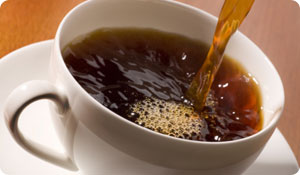
Can caffeine take the pain out of exercise? Recent studies show that moderate caffeine intake prior to working out can indeed reduce muscle soreness. So, does that mean you should down a triple-espresso before hopping on the treadmill? Not necessarily.
We've all been there-a day or so after a strenuous workout, we're stiff, sore, and can't touch our toes to save our lives. That's called "delayed onset muscle soreness" or DOMS. DOMS is usually caused by eccentric muscle contractions. Eccentric contractions increase tension or force on muscles as they lengthen. Think about lowering a weight and the action it produces during a bicep curl. Or, think about running down hill, doing squats, pushups, or any type of sport that requires controlled muscle movements.
While generally associated with muscle strengthening, eccentric contractions are also often associated with muscle soreness. DOMS is normal and not usually a sign of injury, but most athletes would prefer to avoid it. Researchers have recently confirmed what many athletes have known for years- drinking coffee before a workout can help cut down on soreness and reduce DOMS.
University of Illinois kinesiology and community health professor Robert Motl
is quoted in Science Daily on the effects of caffeine on exercise performance. "I think intuitively a lot of people are taking caffeine before a workout and they don't realize the actual benefit they're experiencing. That is, they're experiencing less pain..."
Moti's studies show that caffeine works on the adenosine neuromodulatory system in the brain and spinal cord, and this system is heavily involved in nociception and pain processing." Since Motl knew caffeine blocked adenosine from working, he speculated it could reduce pain. A number of studies by the professor supported that conclusion, even when considering such variables as exercise intensity, dose of caffeine, anxiety, sensitivity, and gender.
It's not just habitual or regular caffeine users who benefit either. His studies show that people who don't usually consume caffeine also benefit with equal amounts of pain reduction.
Does that mean you should increase caffeine consumption for exercise? Not necessarily. Caffeine is generally considered safe and is widely known to be the most commonly taken drug in the world. Too much, however, is associated with hypertension, irregular heart beat, anxiety, nervousness, insomnia, upset stomach, and increased urination.
What else can you do to reduce post-exercise muscle soreness or DOMS?
- Don't push too hard when you're new to exercise or when increasing the amount of exercise you do.
- Add intensity, duration, weight or speed at no more than 10% at a time then wait a week or two before any further increases.
- Stretch "warm" muscles after exercise.
- Drink plenty of water.
- If you think you've overdone it, use RICE: Rest, Ice, Compress and Elevate sore muscles.
If you experience anything more than minor pain, consider taking an over-the-counter anti-inflammatory medication like ibuprofen and call your doctor.





